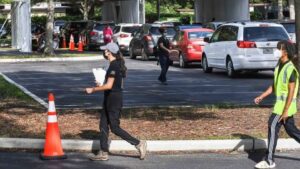There may be ripples. But the Nassau and Suffolk County health commissioners said Friday that despite concerns over the new delta variant, we’re still not seeing anything on Long Island resembling a new wave of COVID-19.
Speaking on the latest Newsday Live webinar titled “COVID-19 and the Delta Variant,” Nassau Health Commissioner Dr. Lawrence Eisenstein and Suffolk Health Commissioner Dr. Gregson H. Pigott said that unlike the prior onslaught of COVID-19, fully vaccinated residents have had relatively low hospitalization rates due to the virus — and that not one vaccinated resident in either county currently requires a ventilator.
And though both health officials said there have been significant increases in the number of those infected — from a low of about 30 cases a day in July to about 300 per day now in Suffolk — most cases are, as Pigott said, “among the unvaccinated.”
That doesn’t mean, however, you shouldn’t remain cautious if fully vaccinated.
“All three of the available vaccines do have breakthrough cases associated with them,” Pigott said, meaning that those vaccinated have still gotten COVID-19.
But even if a vaccinated person gets sick from the coronavirus, it likely won’t be anywhere near as bad as it would be if they are unvaccinated, they said.
“The vaccines do work against the delta variant,” Pigott said. “You might have a couple of days of flulike symptoms. Sore throat, fatigue, muscle ache. But then you get over it.”
As Eisenstein said: “What we’ve seen is the vaccines do work remarkably well.”
Both Pigott and Eisenstein agreed that even the fully vaccinated might be best served to continue to wear a mask in high-density situations, even outdoors. But, as for another lockdown in our future, Eisenstein said: “Every year we have flu and people get sick and unfortunately some people even die, but we don’t lock down. Our hospitals are not stressed, right now.”
If you are vaccinated, there is a chance you might need a booster sometime in the future. But “we’re not seeing a push for booster shots yet,” Pigott said.
The key strategies remain: masking when you don’t know the vaccination or infection status of those around you, good hygiene and hand-washing.
And, of course, both commissioners said, being vaccinated. That’s important, Eisenstein and Pigott said, because the higher the population vaccination rate, the sooner COVID-19 can be eradicated. Or, at least, the sooner the chance for future variant strains can be greatly reduced.
For now, the variant continues to prove more highly contagious than prior strains, though symptoms remain generally the same: loss of taste and smell, cough, fever, sore throat and chills. Coughing and shortness of breath are the biggest concerns, Pigott said. If you have those symptoms, seek immediate treatment, he said.
“The only thing that truly scares me going forward is a mutation that the vaccines don’t work for,” Eisenstein said. “But, the more people who get vaccinated, the less opportunity there is for viruses to mutate — and the less likely it is more people become infected. … We live normally with the flu, we live normally with other coronaviruses.”
Hopefully, he said, before long the same will prove true with COVID-19.



















